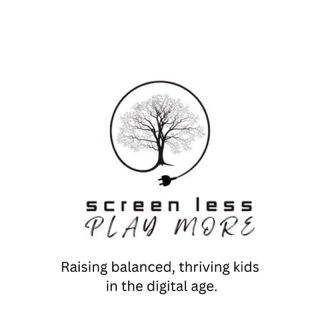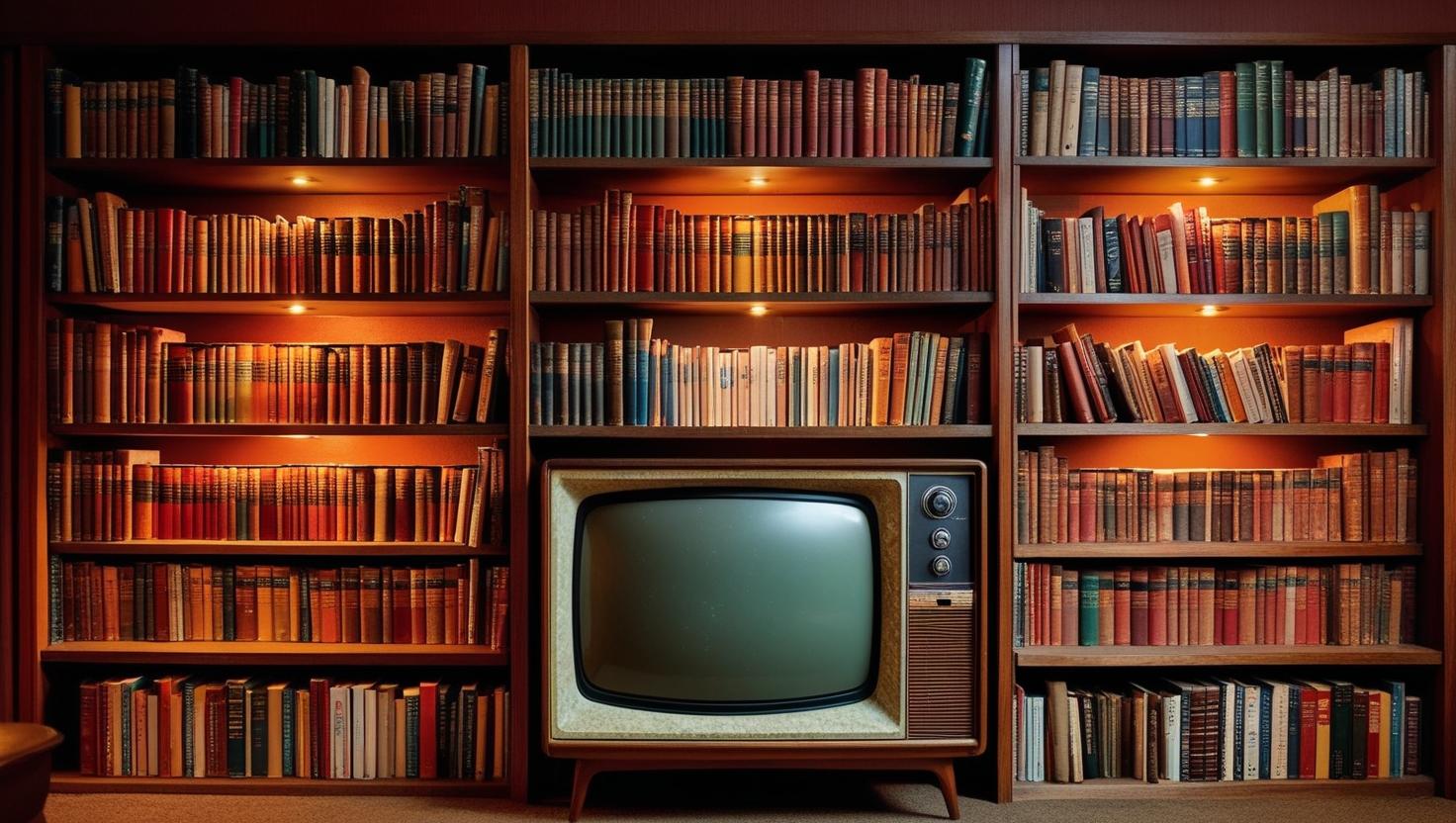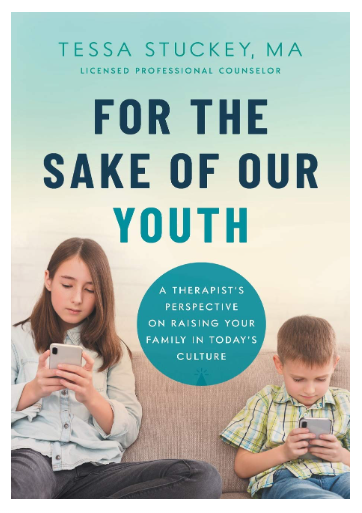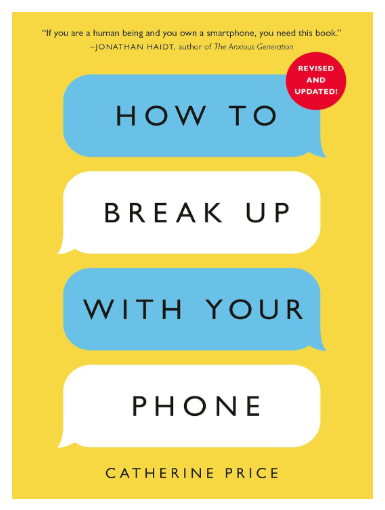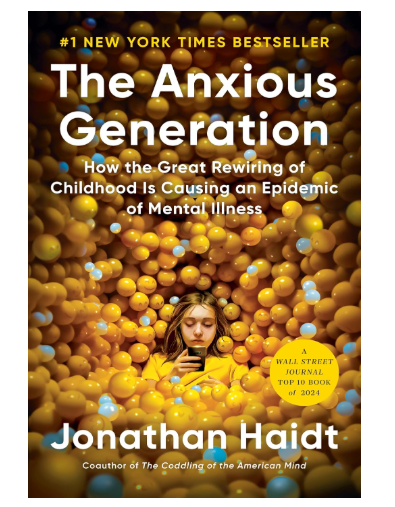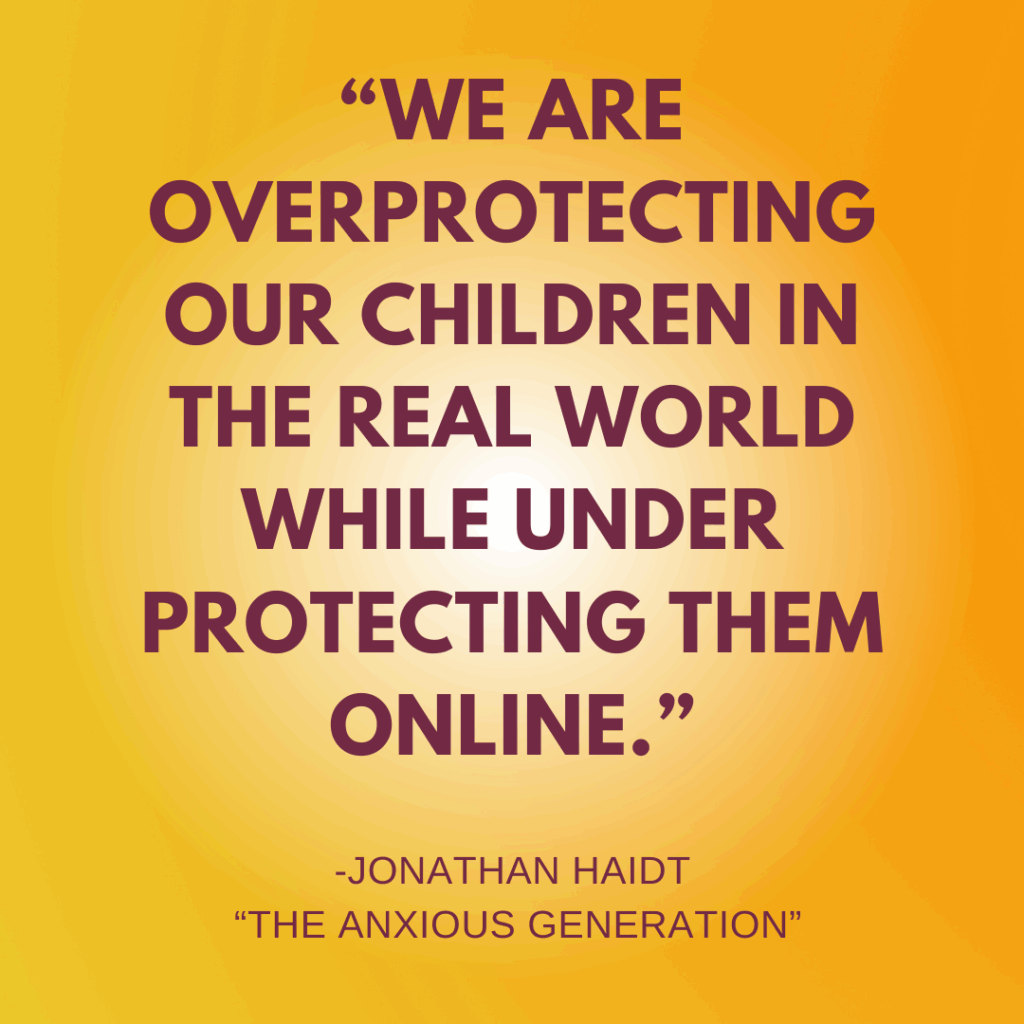Must-Read Books About Screen Time, Social Media, and the Mental Health of Kids and Teens
Your son just attacked you like a rabid werewolf when you asked him to turn off “Minecraft.” Yup, I’ve been there. Here are the best parenting books about screen time that are ready to help.
These are my top 7 picks. (More to come as I make my way through a large stack!) Each book has a different take, but they all have great info and advice on how we got here, and how to get back to a balanced life without screen addiction or tantrums.
Disclosure: I am an affiliate of Bookshop.org, which allows you to buy books online and support LOCAL stores instead of the mega-corporations! I will earn a commission (at no cost to you) if you click through and make a purchase.
The Screentime Solution: A Judgment-Free Guide to Becoming a Tech-Intentional Family
Emily Cherkin, known as “The Screentime Consultant,” offers parents a practical and compassionate guide to raising children in a screen-saturated world. She emphasizes that parents should not feel guilt or shame, since technology is deeply woven into modern life. Instead of aiming for perfection, Cherkin encourages families to be tech-intentional—making conscious, balanced choices about screen use.
It’s one of the most user-friendly parenting books about screen time I have found…. and I have read a LOT of them!
A few of the excellent takeaways from “The Screentime Solution” are:
Create Tech-Free Zones: Keep bedrooms, mealtimes, and family gatherings screen-free to protect rest and connection.
Set Device Curfews – Turn off screens at least an hour before bedtime to support healthy sleep.
Use Screens Together – Watch, play, or explore digital content with your kids to stay connected and model critical thinking.
Encourage Offline Alternatives – Prioritize play, outdoor time, reading, and hobbies so kids see that fun doesn’t always come from screens.
Talk About Persuasive Tech – Explain to them that social media and video games are expressly designed to addict users and keep them on devices as long as possible. If you yourself don’t understand how this works, the next book (Better Than Real Life) is an EXCELLENT dive into the manipulation behind the scenes (and screens!)
You can hear Emily Cherkin’s excellent insights on the Screen Less Play More Podcast:
Better Than Real Life: The Secret Science Addicting Kids To Screens and How To Save Childhood
Dr. Richard Freed is letting us in on a little secret.
Actually, it’s an enormous secret. Today’s screen time is not the same as your Saturday morning cartoons. Silicon valley is intentionally hacking your psychology (and that of your children) to make screens addictive.
“It’s time to stop pretending that it’s a mystery why this generation of children is leaving behind spending time with family, playing outside, engaging in school-related tasks, and a host of other health-giving real-world activities. Hidden forces are at work,” says Freed. “This is by design.”
He advises us, “parents should not feel, like ‘what have I missed?’ This has purposefully been hidden.”
In the mid-1990s, there was an entire class at Stanford University, alma mater to most of the tech titans, that taught how digital devices and apps could use behavioral psychology to alter human behavior. A.k.a, turning your child’s phone or iPad into a slot machine. This class is “now colloquially referred to as the ‘Facebook class.'” Dr. Freed writes, “Where did Fogg’s deciples go after the class was over? Many entered Silicon Valley industry, applied his methods, and cashed in.”
Dr. Freed tells us all about this in the Screen Less Play More podcast:
Buy your copy of “Better Than Real Life” on Amazon here!
Big Tech’s Formula of Addiction
This is one of the best parenting books about screen time because it specifically explains to you how the addiction is baked-in to tech. Once you understand, you can explain it to your kids.
Big tech combines motivation, ability, and triggers to get kids addicted to their screens. Kids are motivated to go on social media and video games because they offer psychological rewards such as entertainment, humor, and a sense of belonging.
They may be motivated to return to sites like Snapchat due to incentives such as “Snapstreak.” The Snapstreak feature indicates how many consecutive days two users have been sending each other photo or video Snaps, and rewards them for not breaking their streak.
The “ability” part of the equation is essentially how easy the apps are. Dr. Freed explains, “You can roll over on your bed and maybe consume half a calorie, and click buttons for hours on end.” The “trigger” part of the equation could be an email from Facebook that says you haven’t logged in for a while, it could be a notification “ping” that you have a new “like,” or it could be something within a video game triggering you to continue playing. Freed says that persuasively designed technology is “always triggering you to go access those easy rewards.” He warns that “Silicon Valley wants to trigger you until you develop an internal trigger.”
Once people develop an internal trigger, they may find themselves at a stop light or waiting their turn in line, and feel compelled to check their social media accounts. At that point, kids and adults are truly addicted to screens. Dr. Freed says it’s like the cigarette smoker that smokes after dinner. “Why did I light up after a meal? I don’t know, I just did it….These are impulses that we don’t even know why we’re doing them. Ask a kid why they’re living their lives on a video game, a phone, or social media, and they’ll say ‘I don’t know.’”
It’s One of The Best Parenting Books on Screen Time

There is soooooo much more amazing information in this book that I can’t lay out here. It explains why parental controls are not enough, and gives us a framework for how we can resist!
But please read for yourself! “Better than Real Life” is a compelling exposé on how tech companies employ psychological tactics to captivate children’s attention, leading them away from essential real-world experiences.
Buy your copy here! Learn more about why screens are so addictive. (As an Amazon Associate I earn from qualifying purchases.)
The Tech Exit – A Practical Guide to Freeing Kids and Teens from Smartphones
Most people think that smart phones are like sugar, or alcohol, or any type of vice that you can do in moderation. But Clare Morell, author of “The Tech Exit” argues that we have our metaphor wrong.
“Digital technologies are not like sugar. For the developing brains of children and teens, they are more like fentanyl,” says Morell.
She explains that even a small amount of time on screens creates a strong craving for more. And that parental controls give a false sense of security. That is why she advocates that kids not just reduce their screen time, but that they exit digital technology entirely- with a tech exit.
Author Clare Morell, a fellow at the Ethics and Public Policy Center, suggests that the most successful way to detox from screens is by using the acronym FEAST.
F – Find other families – Doing the Tech Exit alone is very hard, thus having other families “in the same boat” is important. It also really helps if your children have other tech-free friends to play and hang out with.
E – Explain, Educate, and Exemplify – Parents need to explain to kids why they’re going low tech or no tech, as well as detail the harms of addictive technology. Kids will get on board easier if they understand why tech is addictive, and see parents walking the walk.
A – Adopt Alternatives – Find non-tech alternatives to fill time, (outings, board games, books, exercise) as well as replacements for technology. This could look like replacing cell phones with land lines, using a paper map instead of GPS, cooking with a cook book instead of Pinterest, listening to a stereo instead of Spotify, or using a watch instead of a phone clock.
S- Set Up Digital Accountability and Family Screen Rules – Establish how and when screens may be used. This may mean that kids are allowed to use a family computer for homework, but not scrolling or gaming. This may mean that kids use a “dumb phone” to keep in touch with parents, but cannot use it in bedrooms or private spaces. You decide what works for your family
T- Trade Screens for Real-Life Responsibilities and Pursuits – Replace mindless screen time with meaningful responsibilities such as chores, community service, and IRL friendships! There is a great story in the book about a high school boy who was promised a phone, but when he didn’t seem ready for it, his parents gave him an old pickup truck instead. He spent the summer having freedom, social opportunities, and starting a business that earned him lots of pocket money. This real life opportunity prepared him for the independence and responsibility of college WAY more than owning a cell phone would have.
Look for an interview with Clare Morell on the Screen Less Play More Podcast in December 2025!
For the Sake of Our Youth: A Therapist’s Perspective on Raising Your Family in Today’s Culture
Excellent parenting book about child mental health
In her practice, Tessa started recognizing a trend about 6 years ago. “Kids would come to me with typical life stressors, mom got mad at them, they didn’t empty their dishwasher, or they made a C on a chemistry exam. Typical life stressors. But their go-to answer was always a dark, dark thought, whether that be self-harm or suicidal thinking.”
Tessa started investigating and found that “every single one of them had issues that were rooted back to an overuse of unhealthy screens or social media.“
Tessa writes in her book about the 6 cultural influences that she believes are driving this trend. I know this all may sound vague, but honestly, this is one of the best books about parenting and screen time I have ever read. The information is so smart, the style is easy to comprehend, and the advice is outstanding! She doesn’t just tell us what the problem is, she tells us how to solve it!
Tessa explains that suicide is becoming glorified in pop culture, and especially on social media, which is yet another reason to keep young kids off the internet! Very importantly, Tessa points out that the world has become one of immediate gratification, and kids are turning to unhealthy quick-fixes. Tessa says, “I realized that this was a true societal cultural issue that was almost encouraging our kids to live in a world where if they can’t have an instant fix, then they shouldn’t learn how to truly self-regulate.”
Kids need to have an arsenal of coping mechanisms, a tolerance for boredom, and an attractive life off of screens. Kids will want to get off of social media if they have a fun alternative and a way to connect in-real-life with parents and friends! Family connection is a major way to insulate kids from suicide and dark thoughts.
Tessa went through each of her 6 solutions on The Screen Less Play More Podcast, which you can listen to here:
How To Break Up With Your Phone
Excellent how-to book on reducing screen time
Catherine Price’s book “How To Break Up With Your Phone” is a concise, and very easy to follow guide on improving your relationship with screen time. Catherine’s explains that you don’t have to ditch your phone entirely, but you should take control of it—rather than letting it control you. The goal is to build a healthier, more intentional relationship with your device.
“How To Break Up With Your Phone” comes in two parts.
Part I: The Wake-Up
This section explains why we should reconsider our phone use.
- Phones are designed to be addictive: Apps and social media platforms use psychological tricks (like dopamine feedback loops) to keep us hooked.
- Impact on mental health: Excessive phone use is linked to anxiety, depression, sleep problems, and reduced attention spans.
- Effect on relationships and productivity: Phones often distract us from real-life interactions and deep, meaningful work.
- The illusion of multitasking: Constant notifications fragment our attention and hinder focus.
Part II: The Break-Up
This part offers a 30-day plan to change your habits and regain control over your phone use.
Key Strategies:
- Track your usage: Become aware of how and when you use your phone.
- Change your environment: Turn off non-essential notifications, keep the phone out of reach, especially in the bedroom.
- Create no-phone zones: Designate areas or times where phones are off-limits (e.g., meals, mornings, evenings).
- Replace screen time with meaningful activities: Reconnect with hobbies, people, and downtime.
- Use apps intentionally: Reframe your phone as a tool instead of a source of endless entertainment.
- Mindfulness and reflection: Incorporate mindful practices to stay present and better understand your relationship with your phone.
Author Catherine Price has also teamed-up with Jonathan Haid to write a kids version of “The Anxious Generation.” Learn all about upcoming “The Amazing Generation” here!
The Opt-Out Family
“While you’re watching TikTok, it’s watching you,” Erin explains to us in “The Opt Out Family: How to Give Your Kids What Technology Can’t.”
“Through the camera on your phone, TikTok can detect changes in your face as you react to each and every video you watch. What makes you smile? What makes you laugh? What raises your eyebrows? And for how long? TikTok studies that information to determine what you’ll like next- and better.” Erin continues, “Imagine: you’re a teenage girl watching a typical TikTok dance challenge. But through biometrics, the app registers that your eyes are distracted by the flat belly of one of the dancers, her toned thighs. In the next video, you’re zeroing in on someone’s triceps, and your heart beats faster. The next video? An influencer in an undisclosed ad for a three-day detox cleanse and workout ebook to guarantee ‘you’ll look amazing for your next Tik Tok.’ Just $199. Click. Add to cart.”
Erin’s book is full of riveting revelations about how social media titans are using every tool at their disposal to manipulate and addict us. (Again, one of the best parenting books about parenting in the digital age!) Drawing from her personal journey as a former social media influencer, Erin Loechner offers a roadmap to foster deeper connections and a more intentional family life. She explains many, many ways that our families can “become more engaging than the algorithm.” She has very specific examples of screen-free activities to do with your kids, and methods to turn your family’s attention away from screens and back to real life.
Erin shares so much of her amazing advice on The “Screen Less Play More” Podcast. Listen below!
The Anxious Generation: How the Great Rewiring of Childhood is Causing an Epidemic of Mental Illness
The best selling parenting book about screen time
If you’ve been too busy stepping on Legos and driving to piano lessons, here’s your quick summary of the best book about screen time, youth, and social media!
“The Anxious Generation” by Jonathan Haidt argues that the play-based childhood of our youth has been replaced with the phone-based childhood of now, and it’s not good. No bueno. Negatory, good buddy.
But there’s hope!
In Jonathan Haidt’s book, he explains “How the Great Rewiring of Childhood Is Causing an Epidemic of Mental Illness.” Haidt puts forth 4 things we can all do to get our children back (and get them some bonna fide childhoods instead of the hot garbage they’re living on TicTok.)
What are the 4 rules of The Anxious Generation ?
- No smartphones before high school.
- No social media before 16.
- Phone-free schools.
- Far more unsupervised play and childhood independence.
Haidt suggests that our kids need “physical play, outdoors and with other children of mixed ages.” In other words, take your kids to the park and let them play tag with the other kids who are already there. Let your kids have a play date in your backyard without constantly telling them what to do.
“When parents, teachers, and coaches get involved, it becomes less free, less playful, and less beneficial. Adults usually can’t stop themselves from directing and protecting.” (So do yourself a favor; read a book on the porch and they will completely forget you are there until they need a band-aid.)
If you’d like to listen to a quick summary of the books’ most important points, check it out here:
Unfortunately, a lot of parents think that by keeping their kids inside, they’re keeping them safe from child predators. But, “sex criminals nowadays spend most of their time in the virtual world because the internet makes it so much easier to communicate with children and to find and circulate sexual and violent videos involving children.”
Aside from access to child predators, Haidt argues that a phone-based childhood presents four foundational harms:
- Social deprivation
- Sleep deprivation
- Attention fragmentation
- Addiction
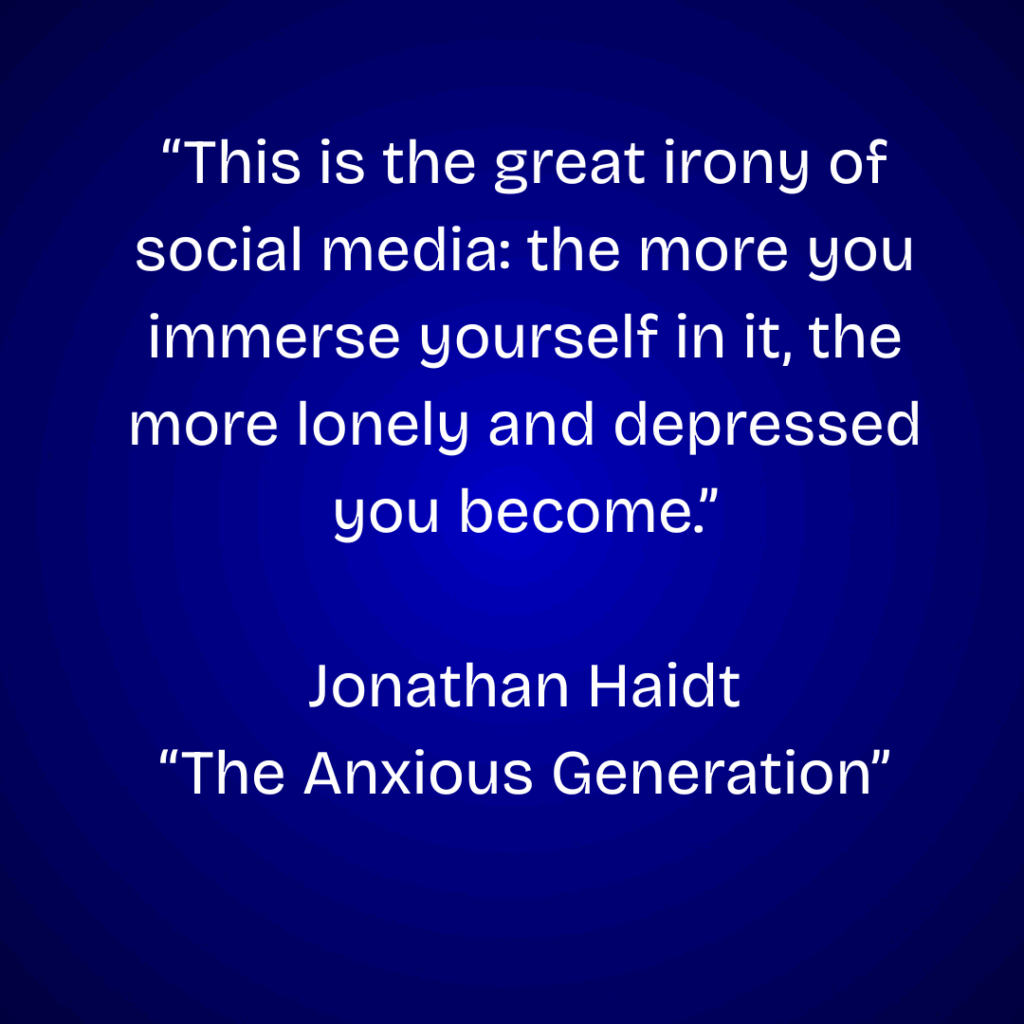
I have a much more extensive review of “The Anxious Generation” that you can read here!
Checkout my Substack!
Snapchat Thought I Was 15. What It Showed Me Was Shocking.
Should I light my child’s iPad on fire, or grind it in the garbage disposal? Asking for a friend…
Why are kids so addicted to screens? Hint: It’s by design
How Money and Mania are Ruining Kids’ Sports
Why is play important for children?
Family dinner doesn’t have to be a disaster
You Could Learn A Lot From an Oompa-Loompa
What is the Manosphere? And How Can We Protect Our Kids From Its Influence?
More amazing books:
See all of my book recommendations at my Bookshop.org link!
The Amazing Generation by Jonathan Haidt and Catherine Price – read all about it here!
Kids books that promote imagination and play
“Hunt, Gather, Parent” is the only parenting book you’ll ever need.
And find out here “Is social media safe for kids?“
Learn the secret science behind why screens are so addictive!
